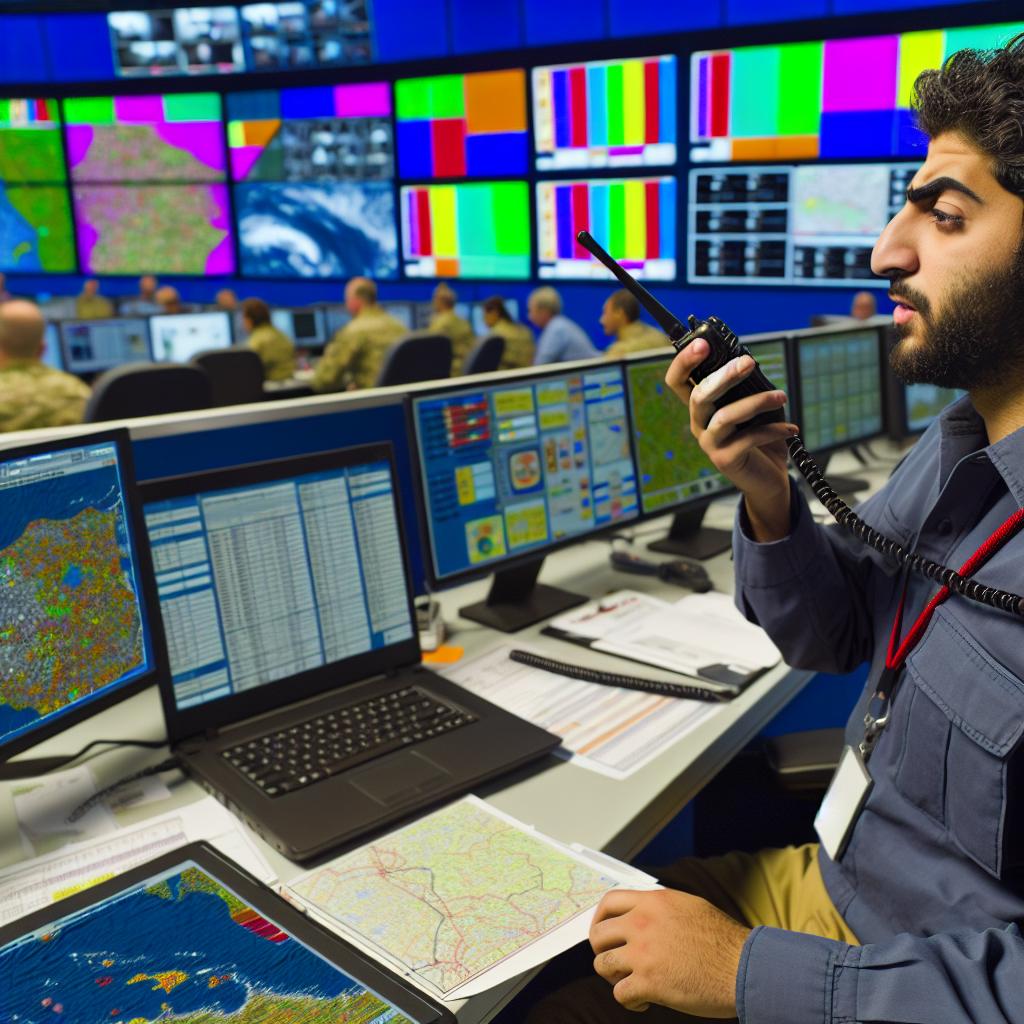Introduction:
Disaster response coordinators are responsible for organizing and coordinating relief efforts during emergencies.
The nature of this role is highly stressful due to the urgency and severity of the situations they face.
It is crucial for disaster response coordinators to manage stress effectively to ensure they can perform their duties efficiently.
They must make sound decisions under pressure.
Understand the Nature of Stress in the Role:
As a disaster response coordinator, you will face various stressors.
These stressors can range from high-pressure situations to emotional toll.
The job can take a toll on your mental and physical health.
Long hours, decision-making, and dealing with traumatic events add to stress.
The pressure to perform under challenging circumstances can be overwhelming.
Constant exposure to suffering and trauma can lead to compassion fatigue.
Balancing multiple tasks and responsibilities can cause burnout.
The role requires quick thinking and problem-solving in crisis situations.
The uncertainty and unpredictability of disasters can increase stress levels.
Lack of resources and support can contribute to stress in this role.
Emotional Toll of the Job:
Disaster response coordinators often experience high levels of emotional stress.
Witnessing the impact of disasters on individuals and communities can be distressing.
Dealing with loss, grief, and trauma on a daily basis can be emotionally draining.
The responsibility of making tough decisions that affect lives can be challenging.
The need to remain calm and composed in crisis situations can be difficult.
Managing emotions while providing support and leadership is crucial.
Transform Your Career Today
Unlock a personalized career strategy that drives real results. Get tailored advice and a roadmap designed just for you.
Start NowPhysical and Mental Effects of Stress:
Stress can manifest physically through headaches, fatigue, and muscle tension.
Chronic stress can weaken the immune system and increase the risk of illnesses.
Sleep disturbances, appetite changes, and digestive issues can occur due to stress.
Mental effects of stress include anxiety, depression, and irritability.
Cognitive functions may be affected, leading to difficulty concentrating and making decisions.
Burnout and compassion fatigue can result from prolonged exposure to stress.
It is essential to recognize the signs of stress to prevent long-term health issues.
Seeking support from colleagues, friends, or mental health professionals is crucial.
Practicing self-care, mindfulness, and stress management techniques can help mitigate the effects of stress.
Building resilience and coping strategies is essential for managing stress in this demanding role.
Practice self-care:
Emphasize the importance of self-care in managing stress.
Discuss healthy habits such as exercise, proper nutrition, and adequate sleep.
Encourage the use of relaxation techniques like meditation or mindfulness.
As a disaster response coordinator, it is crucial to prioritize self-care to effectively manage stress and prevent burnout.
Taking care of yourself is not selfish; it is necessary to ensure you can continue to help others in times of crisis.
First and foremost, emphasize the importance of self-care to your team members and colleagues.
Encourage them to make their well-being a priority and remind them that taking care of themselves ultimately benefits the entire response effort.
One of the key aspects of self-care is maintaining healthy habits.
Regular exercise not only helps alleviate stress but also boosts mood and overall well-being.
Encourage your team to find physical activities they enjoy and make time for them regularly.
Transform Your Career Today
Unlock a personalized career strategy that drives real results. Get tailored advice and a roadmap designed just for you.
Start NowProper nutrition is another essential component of self-care.
Eating a balanced diet rich in fruits, vegetables, lean proteins, and whole grains can provide the energy and nutrients needed to cope with the demands of disaster response work.
In addition to exercise and nutrition, adequate sleep is crucial for managing stress.
Encourage your team members to prioritize sleep and create a restful bedtime routine to ensure they are getting the recommended amount of rest each night.
Beyond physical health, encourage the use of relaxation techniques to manage stress.
Meditation, mindfulness, deep breathing exercises, and progressive muscle relaxation are effective ways to calm the mind and reduce anxiety.
Consider incorporating short meditation or mindfulness sessions into your team meetings or offering resources for relaxation techniques.
Encourage team members to take short breaks throughout the day to practice these techniques and recharge.
Remember that self-care is not a luxury but a necessity, especially in high-stress environments like disaster response.
By prioritizing self-care and encouraging healthy habits, you can better support yourself and your team in managing stress and staying resilient during challenging times.
Uncover the Details: How to Become a Licensed Private Investigator
Seek Social Support
When dealing with stress as a disaster response coordinator, seeking social support can be a crucial element in maintaining your well-being and resilience.
Here are some ways you can seek social support:
- Encourage disaster response coordinators to build a support network.
- Discuss the benefits of talking to colleagues or friends about stress.
- Suggest joining support groups or seeking professional help when needed.
As a disaster response coordinator, it is important to have a strong support system in place.
You can start by reaching out to colleagues who understand the nature of your work and can empathize with the challenges you face.
Building these connections can provide you with a sense of camaraderie and solidarity during difficult times.
Talk to Colleagues or Friends
Don’t hesitate to open up about your stress with trusted colleagues or friends.
Talking about your feelings and experiences can help you process your emotions and gain valuable insights from others.
This interaction can also help you feel less isolated and more connected to those around you.
Join Support Groups
Consider joining support groups specifically designed for disaster response coordinators or individuals in high-stress professions.
Transform Your Career Today
Unlock a personalized career strategy that drives real results. Get tailored advice and a roadmap designed just for you.
Start NowThese groups can offer a safe space for you to share your struggles, receive advice, and connect with others who are facing similar challenges.
Being part of a supportive community can provide you with much-needed validation and encouragement.
Seek Professional Help
If you find that your stress levels are becoming overwhelming and affecting your daily life, don’t hesitate to seek professional help.
A therapist or counselor can provide you with the tools and strategies you need to cope with stress effectively.
They can also offer a non-judgmental space for you to explore your thoughts and feelings in a healthy and constructive manner.
Remember, seeking social support is not a sign of weakness but a proactive step towards taking care of your mental health.
By surrounding yourself with a supportive network, you can better navigate the challenges of being a disaster response coordinator.
This ensures that you are equipped to handle stress in a healthy and sustainable way.
Uncover the Details: Crime Scene Investigator Role in Court Testimonies
Develop Effective Time Management Skills
Acknowledge the fast-paced and demanding nature of the job.
Recognize that stress often stems from feeling overwhelmed by tasks.
Break down tasks into smaller, more manageable chunks.
Set realistic deadlines and goals for each task.
Tips on Prioritizing Tasks and Setting Boundaries
- Identify urgent tasks that need immediate attention.
- Rank tasks based on their importance and deadline.
- Avoid multitasking, as it can lead to decreased productivity.
- Learn to say no to additional responsibilities when necessary.
The Importance of Delegating Responsibilities
- Recognize that you cannot do everything on your own.
- Delegate tasks to trusted team members or volunteers.
- Provide clear instructions and expectations when delegating.
- Trust your team to get the job done effectively.
Delve into the Subject: Cybersecurity Specialist vs. Cybersecurity Analyst: Key Differences
Building Resilience for Disaster Response Coordinators
Building resilience is essential for disaster response coordinators to effectively handle stress and navigate difficult situations.
Understanding Resilience
Resilience is the ability to bounce back from adversity and adapt to challenging circumstances.
It involves maintaining a positive outlook and mindset despite facing stressors.
Cultivating Resilience
- Develop problem-solving skills: Disaster response coordinators should be able to think critically and find solutions to complex problems quickly.
- Cultivate optimism: Maintaining a hopeful attitude and focusing on positive outcomes can help combat stress and adversity.
- Build strong social connections: Having a support system of colleagues and friends can provide emotional support during challenging times.
- Practice self-care: Engaging in activities that promote physical and mental well-being, such as exercise and mindfulness, can help reduce stress levels.
- Learn from failures: Viewing setbacks as learning opportunities can help build resilience and improve problem-solving skills.
Benefits of Resilience for Disaster Response Coordinators
Resilience is a crucial trait for disaster response coordinators as it enables them to:
- Remain calm under pressure: Resilient coordinators are better equipped to stay composed and make sound decisions during emergencies.
- Adapt to changing circumstances: Being flexible and adaptable allows coordinators to adjust their plans based on evolving situations.
- Maintain a positive attitude: Optimism can help coordinators stay motivated and focused on their tasks, even in the face of challenges.
- Effectively manage stress: Resilient individuals are more adept at coping with stress and preventing burnout in high-pressure environments.
- Inspire others: Displaying resilience can serve as a source of inspiration for team members and encourage a culture of strength and perseverance.
Building resilience is a valuable skill for disaster response coordinators to cultivate.
It enhances their ability to cope with stress, navigate challenging situations, and effectively lead their teams during emergencies.
Transform Your Career Today
Unlock a personalized career strategy that drives real results. Get tailored advice and a roadmap designed just for you.
Start NowGain More Insights: Benefits and Perks of Being a Border Patrol Agent

One key aspect of managing stress as a disaster response coordinator is to implement stress-reducing strategies.
These strategies can help you stay focused and maintain a clear mind to effectively handle challenging situations.
Here are some tips to consider:
Offer practical tips for managing stress in the moment
In high-stress situations, it’s important to have quick and effective strategies to help you calm down and refocus.
This can include practices like mindfulness exercises, brief meditation sessions, or physical activities like stretching or walking.
Find what works best for you and make it a part of your routine.
Discuss the benefits of deep breathing exercises or taking short breaks during intense situations
Deep breathing exercises can help activate your body’s relaxation response, reducing stress and promoting a sense of calm.
Taking short breaks, even just a few minutes away from the situation, can give you a chance to regroup.
This helps you approach the issue with a fresh perspective.
Don’t underestimate the power of simple techniques like these in managing stress effectively.
Encourage the use of humor or positive thinking to alleviate stress
In times of high stress, finding moments of humor or shifting your perspective can be incredibly helpful.
Laughter has been shown to reduce stress hormones and increase feelings of well-being.
Positive thinking can help reframe challenges as opportunities for growth and learning.
Embracing a lighthearted approach can go a long way in managing stress as a disaster response coordinator.
By incorporating these stress-reducing strategies into your routine, you can build resilience and better cope with the demands of your role.
Remember, taking care of your mental and emotional well-being is essential not only for yourself but also for those you serve in times of crisis.
Engage in regular debriefing sessions:
Debriefing sessions are essential for disaster response coordinators to process the emotional weight of their work.
These sessions provide a safe space to share experiences, feelings, and reactions in a supportive environment.
By discussing the stressful event with colleagues or mental health professionals, coordinators can gain new perspectives and insights.
Transform Your Career Today
Unlock a personalized career strategy that drives real results. Get tailored advice and a roadmap designed just for you.
Start NowThis can help them process their emotions and thoughts more effectively, leading to better coping mechanisms.
Reflecting on responses and learning from each situation is crucial for personal and professional growth.
Debriefing sessions allow coordinators to identify areas of improvement and develop strategies to handle similar situations better in the future.
Through debriefing sessions, disaster response coordinators can enhance their resilience and emotional well-being.
It is a proactive approach to managing stress and promoting mental health in a demanding and challenging role.
Regular debriefing sessions are a valuable tool for disaster response coordinators to navigate the stress and emotional toll of their work effectively.
By engaging in these sessions, coordinators can strengthen their coping skills, improve their mental well-being, and enhance their overall performance in managing disasters.
- Highlight the importance of processing emotions and experiences after a stressful event.
- Discuss the benefits of debriefing sessions with colleagues or mental health professionals.
- Encourage disaster response coordinators to reflect on their responses and learn from each situation.
Importance of Self-Care for Disaster Response Coordinators
As a disaster response coordinator, managing stress is crucial for effective response.
Key points discussed include recognizing signs of stress, utilizing coping mechanisms, and seeking support.
It is essential to prioritize self-care to ensure resilience and sustained performance in the role.
Remember, taking care of yourself enables you to better care for others affected by disasters.
Always reach out for help when needed and never underestimate the power of self-care.
Stay strong, stay resilient, and know that your work as a disaster response coordinator is truly invaluable. You are making a difference.
Additional Resources
Nurses in Disaster Preparedness and Public Health Emergency …
Critical Incident Stress Guide | Occupational Safety and Health …
[E-Books for Sale]
The Big Book of 500 High-Paying Jobs in America: Unlock Your Earning Potential
$19.99 • 500 High-Paying Jobs • 330 pages
Explore 500 high-paying jobs in America and learn how to boost your career, earn more, and achieve success!
See All 500 High-Paying Jobs of this E-Book
1001 Professions Without a Degree: High-Paying American Jobs You Can Start Now
$19.99 • 1001 Professions Without a Degree • 174 pages
Discover 1001 high-paying jobs without a degree! Unlock career tips, skills, and success strategies for just $19.99!




